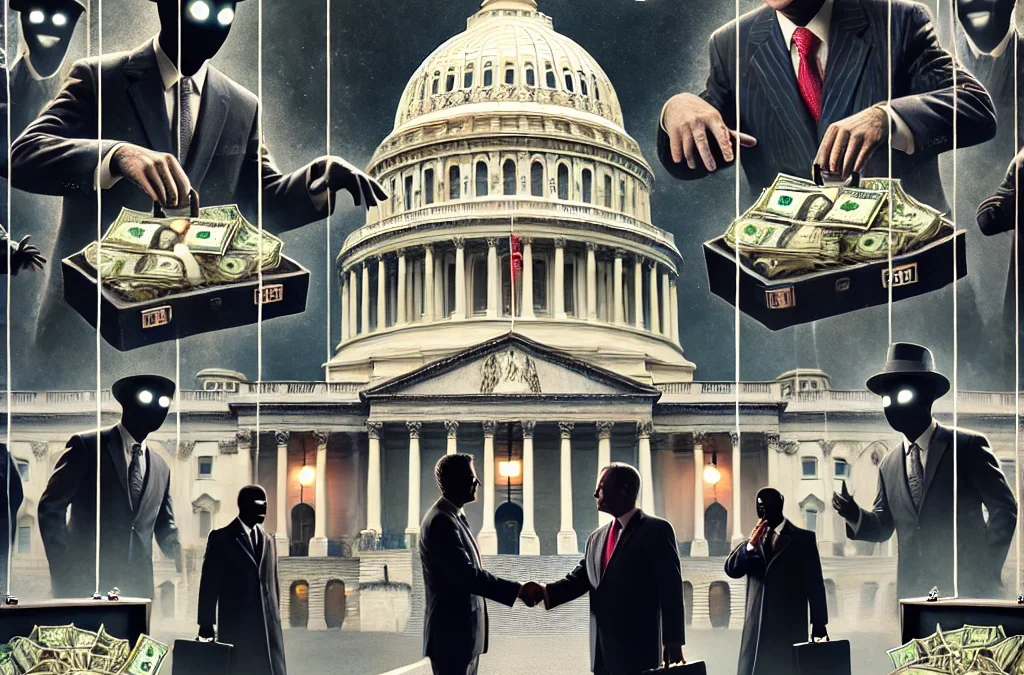Lobbying and Political Corruption: How Corporate Money Shapes U.S. Policy
In the United States, corporate money exerts a powerful influence on public policy. Through lobbying, campaign contributions, and political action committees (PACs), corporations and wealthy individuals have found ways to shape laws and regulations to their advantage. While lobbying is a legal and constitutionally protected activity, the overwhelming presence of corporate money in the political system raises significant concerns about corruption, the undermining of democratic principles, and the marginalization of the voices of ordinary Americans.
This article unpacks the ways in which corporate money influences U.S. policy, examines the impacts of this influence on the political system, and explores potential reforms to reduce the outsized role of money in politics.
The Rise of Corporate Lobbying: A Multi-Billion Dollar Industry
Lobbying refers to the act of attempting to influence the decisions of lawmakers, and it has long been a part of American politics. However, in recent decades, the scale of corporate lobbying has exploded. In 2022, total spending on lobbying activities in the U.S. exceeded $4 billion, according to data from the Center for Responsive Politics. The largest contributors are corporations and industry groups from sectors such as healthcare, finance, technology, and energy.
Lobbying firms and corporate lobbyists are hired to advocate on behalf of specific industries or companies, influencing legislation and regulatory decisions that can significantly impact their profitability. They use a variety of strategies to gain access to lawmakers, from direct lobbying—meeting with members of Congress or regulatory agencies—to more subtle forms of influence, such as sponsoring industry conferences and cultivating relationships with influential staffers.
One of the most concerning aspects of corporate lobbying is that it can lead to an imbalance of power in the policymaking process. Wealthy corporations with vast resources can hire teams of experienced lobbyists to represent their interests, while ordinary citizens and small organizations often lack the financial means to compete for attention. As a result, policies that favor corporate profits often take precedence over those that benefit the broader public.
How Corporate Money Shapes Legislation
The influence of corporate money on legislation is pervasive. Industries such as healthcare, pharmaceuticals, finance, energy, and technology have been particularly effective at shaping policies that favor their interests.
1. Healthcare and Pharmaceutical Lobbying
The healthcare and pharmaceutical industries are among the most prolific spenders when it comes to lobbying. In 2022, healthcare companies spent over $700 million on lobbying efforts. One of the key objectives of healthcare lobbyists has been to prevent reforms that would reduce industry profits, such as efforts to allow Medicare to negotiate drug prices, cap prescription drug costs, or expand public health insurance options.
The pharmaceutical industry’s lobbying efforts are particularly influential. Companies like Pfizer, Johnson & Johnson, and Merck spend millions of dollars each year to influence policy decisions that affect drug pricing and regulation. This lobbying has been highly effective: despite bipartisan public support for measures to lower drug prices, meaningful reforms have been slow to materialize. The pharmaceutical industry has successfully blocked or watered down legislation that would allow the federal government to negotiate drug prices, keeping costs high for consumers.
2. Financial Sector Influence
The financial sector is another powerful player in U.S. politics. Major banks, investment firms, and insurance companies routinely spend hundreds of millions of dollars on lobbying activities. Their influence was particularly visible in the aftermath of the 2008 financial crisis. Despite widespread anger over the role of Wall Street in the economic collapse, the financial industry was able to limit the scope of regulatory reforms aimed at curbing risky behavior.
The Dodd-Frank Act, passed in 2010, was intended to reform the financial system and prevent future crises by imposing new regulations on banks and financial institutions. However, the financial industry’s lobbying efforts significantly weakened the final legislation. Many of the regulations included in Dodd-Frank were rolled back or diluted in subsequent years, as lobbyists worked to protect industry interests. The result is a regulatory framework that is less stringent than what was initially envisioned, leaving the financial system vulnerable to future instability.
3. Energy and Environmental Policy
The energy industry, particularly fossil fuel companies, has also played a significant role in shaping U.S. policy. Oil, gas, and coal companies spend vast sums on lobbying and political contributions to ensure favorable policies that protect their profits. These companies have been especially successful in delaying or blocking efforts to address climate change, despite overwhelming scientific evidence of its impacts.
For decades, fossil fuel companies have funded misinformation campaigns to sow doubt about climate science and undermine public support for environmental regulations. At the same time, their lobbyists have worked to influence policymakers to prioritize industry interests over environmental concerns. This has resulted in weak or delayed climate action, such as the U.S.’s withdrawal from the Paris Agreement in 2017 and the continued expansion of oil and gas drilling on public lands.
While there has been some progress in advancing renewable energy policies in recent years, the fossil fuel industry remains a formidable force in shaping energy policy. Its lobbying efforts continue to stymie more ambitious climate legislation, such as carbon pricing or stricter emissions standards.
Campaign Contributions: Money Buys Access
In addition to direct lobbying, corporate money also flows into political campaigns through donations and political action committees (PACs). While individual contributions from ordinary citizens are capped at a few thousand dollars per election cycle, corporations and wealthy individuals can funnel millions of dollars into elections through PACs, super PACs, and dark money groups, which are often funded by undisclosed donors.
Campaign contributions are a key way that corporations buy access to lawmakers. Politicians rely on donations to fund their campaigns, and those who contribute large sums often gain direct access to elected officials. This dynamic creates a system in which policymakers may feel obligated to prioritize the interests of their donors over those of their constituents.
Super PACs and Citizens United
The 2010 Supreme Court decision in Citizens United v. FEC dramatically changed the landscape of campaign finance. The ruling allowed corporations, unions, and other entities to spend unlimited amounts of money on independent political expenditures, such as campaign ads, as long as they were not directly coordinating with candidates. This gave rise to super PACs, which can raise and spend unlimited sums of money to influence elections.
The Citizens United decision also paved the way for the proliferation of “dark money” in politics—funds donated to nonprofit organizations that are not required to disclose their donors. This lack of transparency allows corporations and wealthy individuals to secretly influence elections and policy decisions, further eroding public trust in the political system.
The Consequences of Corporate Money in Politics
The outsized influence of corporate money in politics has several harmful consequences for democracy and public policy:
1. Policy Favoring Corporate Interests Over Public Welfare
When corporate lobbyists and campaign donors wield disproportionate influence over lawmakers, the result is often policies that prioritize corporate profits over the public good. For example, tax policies that benefit the wealthy and large corporations—such as the 2017 Tax Cuts and Jobs Act—often come at the expense of funding for social programs, healthcare, education, and infrastructure that benefit ordinary Americans.
2. Undermining of Public Trust
The perception that corporate money buys political influence has eroded public trust in government institutions. A 2020 Gallup poll found that only 19% of Americans expressed confidence in Congress, and public approval of the federal government remains at historically low levels. When voters believe that politicians are more responsive to corporate interests than to their constituents, it undermines the legitimacy of democratic governance.
3. Stalled Progress on Critical Issues
Many of the most pressing issues facing the U.S.—from climate change and healthcare reform to income inequality and financial regulation—are being stymied by the influence of corporate money. When policymakers are beholden to industry lobbyists and donors, they are less likely to pursue bold reforms that challenge entrenched interests. This slows progress on issues that are critical to the well-being of the public and future generations.
Efforts to Reform the System
There have been various efforts to address the influence of corporate money in politics, but meaningful reform has been difficult to achieve due to the entrenched power of wealthy donors and lobbyists. However, several key reforms could help reduce the impact of money on the political system:
1. Campaign Finance Reform
One of the most critical reforms is changing the way elections are financed. Proposals such as public financing of elections, small-donor matching systems, and overturning the Citizens United decision through constitutional amendments would limit the influence of wealthy donors and make politicians more accountable to voters.
2. Stronger Lobbying Regulations
Stricter regulations on lobbying activities could help reduce the influence of corporate interests in policymaking. This includes closing the “revolving door” between government and lobbying firms—where former lawmakers and regulators take high-paying lobbying jobs after leaving office—and requiring more transparency around lobbying activities and financial contributions.
3. Transparency and Accountability for Dark Money
Requiring full disclosure of all political donations, including those made to nonprofit organizations and super PACs, would increase transparency and allow voters to see who is funding political campaigns. This would reduce the influence of dark money and hold corporations accountable for their political activities.
Conclusion
Corporate money has a profound impact on U.S. policy, shaping laws and regulations in ways that often benefit the wealthy and powerful at the expense of ordinary Americans. Through lobbying, campaign contributions, and dark money, corporations exert significant influence over the political process, leading to policies that favor profits over public welfare.
Addressing the corrupting influence of money in politics is essential for restoring trust in government, promoting democratic values, and ensuring that public policy serves the interests of all Americans, not just the privileged few. Meaningful reforms—such as campaign finance reform, stronger lobbying regulations, and increased transparency—are necessary to limit corporate power and create a more equitable and just political system. Without these changes, the outsized role of corporate money will continue to undermine the foundations of American democracy.



